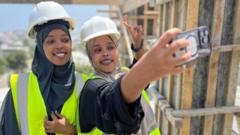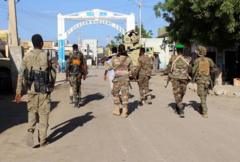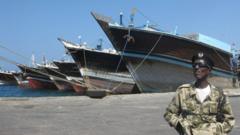In Mogadishu, female engineers Fathi Mohamed Abdi and Saadia Ahmed Omar exemplify the growing role of women in the construction industry as the city undergoes a major transformation. Their leadership in multimillion-dollar projects reflects both the urgent need for skilled professionals and a shift in societal gender norms, all while addressing the challenges that come with rapid urbanization.**
Women at the Forefront of Mogadishu's Construction Revolution**

Women at the Forefront of Mogadishu's Construction Revolution**
Female engineers are reshaping Somalia's capital amid a construction resurgence, challenging traditional norms and contributing to urban development.**
The dusty streets of Mogadishu are witnessing a construction boom that is reshaping the skyline and is notably led by female engineers breaking gender barriers in a traditionally male-dominated industry. Among these trailblazers are Fathi Mohamed Abdi and Saadia Ahmed Omar, young professionals who are overseeing the construction of high-rise buildings in the capital.
At just 24 years old, Ms. Abdi serves as the chief operating officer of Arkan Engineering Services, a Somali-owned construction firm. With construction helmet securely placed, she confidently navigates through bustling job sites, issuing directives to her male colleagues. Despite facing skepticism early in her career—often questioning how a woman could handle such responsibilities—Ms. Abdi's perseverance has led to the successful management of over 30 multimillion-dollar projects.
Ms. Omar echoes her colleague’s sentiments. "Mogadishu needs us," she asserts, reflecting her commitment to infrastructural reconstruction in a city marred by years of civil strife. Born during the chaotic civil unrest, both women have dedicated themselves to developing a nation that they refuse to abandon, unlike many of their peers who sought opportunities abroad.
According to the Somali Engineers Association, more than 6,000 new buildings have transformed Mogadishu's landscape in the last five years alone, a remarkable feat as the city rises from its past. Ibrahim Abdi Heyle, chairman of the association, highlights the pressing need for skilled laborers in the wake of this surge, providing a pathway for women to enter the engineering field, albeit cautiously. "Women's participation is vital in filling critical workforce gaps,” he notes.
Challenges remain, however. Women make up only about 5% of the engineering workforce in Somalia, and many have faced rejection and skepticism when seeking internships. Ms. Omar reflects on a personal journey of over three months before securing her first opportunity, a reminder of the obstacles still inherent in the industry.
Despite criticisms from architects wary of the potential loss of Mogadishu's cultural heritage and safety concerns about rapid construction methods, the enthusiasm among the younger generation persists. Efforts are underway by the local government, emphasizing quality control to ensure structural integrity—a response to decades without regulations amid the construction frenzy.
The global diaspora's investment has been a major driver behind this progress, complemented by enhanced security. Yet concern surrounds the need for comprehensive urban planning, as poorly regulated developments can strain essential city services like sewage and groundwater management.
Environmental advocates warn of the implications of unregulated growth, citing that a synchronized approach to water and resource management is crucial for sustainable development. The government, in collaboration with international partners, is crafting new sewage systems intended to meet the demands of a rapidly growing population.
Despite past setbacks, the women's voices echo a message of hope and resilience that defines Mogadishu's ongoing metamorphosis. Abdi and Omar each express their profound pride in sculpting a modernized city—a vision rooted in the strong belief that women can lead transformative projects that inspire future generations. As urban life thrives amidst the shake of modernity, their stories serve as both personal triumphs and pivotal moments in the evolution of Somalia's societal landscape.




















